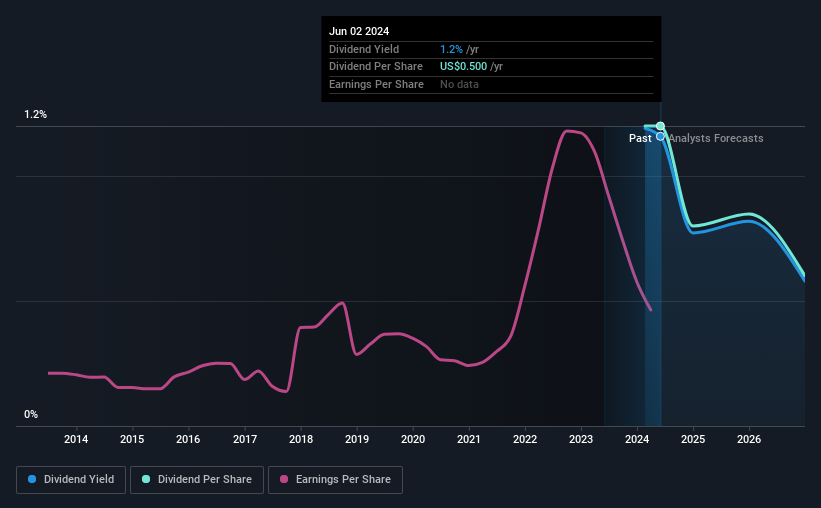Hub Group, Inc. (NASDAQ:HUBG) Looks Like A Good Stock, And It's Going Ex-Dividend Soon
Readers hoping to buy Hub Group, Inc. (NASDAQ:HUBG) for its dividend will need to make their move shortly, as the stock is about to trade ex-dividend. Typically, the ex-dividend date is one business day before the record date which is the date on which a company determines the shareholders eligible to receive a dividend. The ex-dividend date is important as the process of settlement involves two full business days. So if you miss that date, you would not show up on the company's books on the record date. Therefore, if you purchase Hub Group's shares on or after the 7th of June, you won't be eligible to receive the dividend, when it is paid on the 26th of June.
The upcoming dividend for Hub Group will put a total of US$0.125 per share in shareholders' pockets. Dividends are an important source of income to many shareholders, but the health of the business is crucial to maintaining those dividends. That's why we should always check whether the dividend payments appear sustainable, and if the company is growing.
Check out our latest analysis for Hub Group
Dividends are typically paid from company earnings. If a company pays more in dividends than it earned in profit, then the dividend could be unsustainable. Hub Group is paying out just 5.9% of its profit after tax, which is comfortably low and leaves plenty of breathing room in the case of adverse events. That said, even highly profitable companies sometimes might not generate enough cash to pay the dividend, which is why we should always check if the dividend is covered by cash flow. Luckily it paid out just 2.7% of its free cash flow last year.
It's encouraging to see that the dividend is covered by both profit and cash flow. This generally suggests the dividend is sustainable, as long as earnings don't drop precipitously.
Click here to see the company's payout ratio, plus analyst estimates of its future dividends.
Have Earnings And Dividends Been Growing?
Businesses with strong growth prospects usually make the best dividend payers, because it's easier to grow dividends when earnings per share are improving. Investors love dividends, so if earnings fall and the dividend is reduced, expect a stock to be sold off heavily at the same time. Fortunately for readers, Hub Group's earnings per share have been growing at 10% a year for the past five years. The company has managed to grow earnings at a rapid rate, while reinvesting most of the profits within the business. This will make it easier to fund future growth efforts and we think this is an attractive combination - plus the dividend can always be increased later.
This is Hub Group's first year of paying a regular dividend, which is exciting for shareholders - but it does mean there's no dividend history to examine.
To Sum It Up
From a dividend perspective, should investors buy or avoid Hub Group? We love that Hub Group is growing earnings per share while simultaneously paying out a low percentage of both its earnings and cash flow. These characteristics suggest the company is reinvesting in growing its business, while the conservative payout ratio also implies a reduced risk of the dividend being cut in the future. Hub Group looks solid on this analysis overall, and we'd definitely consider investigating it more closely.
On that note, you'll want to research what risks Hub Group is facing. In terms of investment risks, we've identified 1 warning sign with Hub Group and understanding them should be part of your investment process.
Generally, we wouldn't recommend just buying the first dividend stock you see. Here's a curated list of interesting stocks that are strong dividend payers.
Have feedback on this article? Concerned about the content? Get in touch with us directly. Alternatively, email editorial-team (at) simplywallst.com.
This article by Simply Wall St is general in nature. We provide commentary based on historical data and analyst forecasts only using an unbiased methodology and our articles are not intended to be financial advice. It does not constitute a recommendation to buy or sell any stock, and does not take account of your objectives, or your financial situation. We aim to bring you long-term focused analysis driven by fundamental data. Note that our analysis may not factor in the latest price-sensitive company announcements or qualitative material. Simply Wall St has no position in any stocks mentioned.

 Yahoo Finance
Yahoo Finance 
